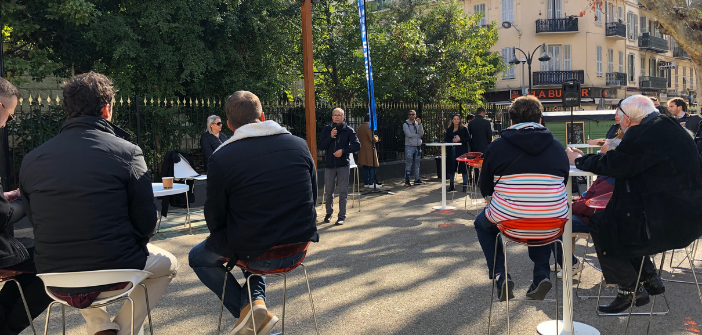This Wednesday, March 2, the Positive Ecology Cafés took place, an initiative set up by the Nice Côte d’Azur metropolis, allowing residents of Nice to engage in discussions with city officials about ecological transition.
In practice, this means that the people of Nice can share their ideas and proposals to accelerate the ecological transition within the city—ideas that the officials consider. This third edition revolved around the theme “City of Tomorrow for All” and was hosted by Richard Chemla, Deputy Mayor of Nice in charge of health, ecology, and well-being, and by Isabelle Visentin, Deputy Mayor of Nice in charge of religious affairs and the Coeur de Nice area.
During this hour-and-a-half debate, several themes were discussed, with various citizens voicing their opinions—alternating between concrete proposals and repeated complaints. Here are some of the main proposals that were expressed.
Noise Pollution
The first theme raised by a citizen present was the issue of noise pollution and the importance of education regarding this urban problem. A matter the city hall seems to be addressing, as Richard Chemla reminded, with a radar recently installed on Avenue Félix Faure and more to be implemented soon. However, he added that fines could only be imposed by the State.
Education in schools is also one of the key aspects the city hall is focusing on concerning noise pollution, a real issue in France since noise is the leading medical reason for medication use in the country.
Implementation of Pedal Taxis
During the debate, a member of the Nice-based company Happy Moov, which offers pedal-taxi services, expressed a desire to expand this service, which he believes could appeal to a broader audience. The Deputy Mayor was very receptive to this request and announced plans to schedule a meeting with the company “within the next fifteen days” to develop this soft mobility concept for people with reduced mobility or seniors.
Regarding bicycle travel, a citizen proposed closing two lanes of the Promenade des Anglais every Sunday to reserve them for bicycles. A solution that is “simple and not very expensive” and would address the issue of too many cyclists compared to the size of the bike lane. A proposal to which the Deputy Mayor expressed partial favor unless it wasn’t for the high cost of this system (€30,000 for one day).
Creation of Urban Micro-Forests
“What about creating micro-forests within the city?” asked a teacher present during the debate, who believes the city lacks green spaces and that trees surrounded by concrete do not constitute a green space.
Nice is a green city on the hills, Richard Chemla asserts. The challenge now is to bring greenery back to the city center, which will be “complicated”, as the Deputy admits. Nevertheless, he reminded that all nurseries and schoolyards in the city, as well as the Ariane and Moulins neighborhoods, will be replanted.
Despite these positive dialogues, this third edition of the Positive Ecology Cafés was punctuated with remarks and criticisms from citizens, some denouncing a lack of adherence to the city’s commitments, others describing the bike lanes as “ridiculous and impractical”, and reminding that Nice is the “second most polluted city in France”.


